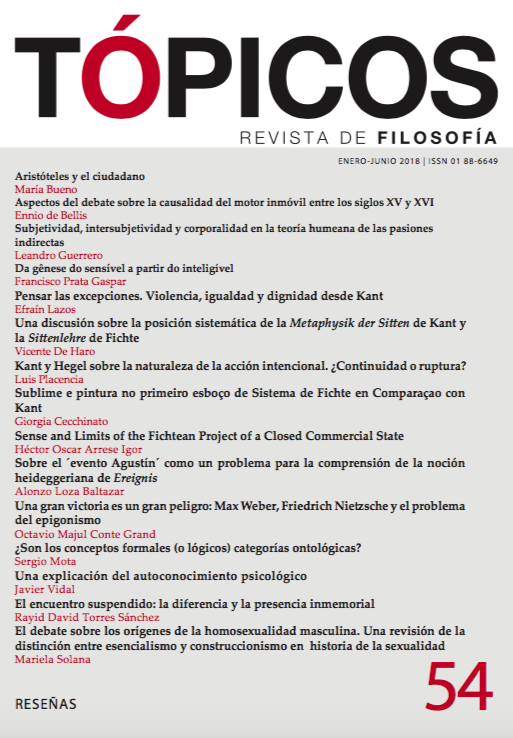Articles
About ‘the Augustine Event’ as a Problem for the Understanding of Heidegger’s Notion of Ereignis
Published 2017-11-11
How to Cite
Loza Baltazar, A. (2017). About ‘the Augustine Event’ as a Problem for the Understanding of Heidegger’s Notion of Ereignis. Tópicos, Revista De Filosofía, (54), 237–261. https://doi.org/10.21555/top.v0i54.802
Downloads
Download data is not yet available.
Altmetrics
Citas
Abstract
The paper deals with some thesis about the relationship between Augustine of Hippo and Heidegger. The aim is to discuss the notion of event as presented in the Beiträge zur Philosophie. Vom Ereignis. First, I shall show the more explicit relations between both thinkers highlighting some similarities. Then, I will raise the issues implied in Heidegger’s reception of tradition (specifically Augustine, not only as a thinker but also as an event) and its consequences for the notion of event.References
- Agustín (2007). Confesiones. [C] 2ª ed. A. Uña Juárez. (trad.) (Los esenciales de la filosofía). España: Tecnos.
- _____ (1995). La piedad con los difuntos. [PD] En Obras de San Agustín. T. 40. Madrid: Biblioteca de Autores Cristianos.
- _____ (1958) La ciudad de Dios. [CD] En Obras de San Agustín. T. 16 y 17. Madrid: Biblioteca de Autores Cristianos.
- Capelle, P. ( 2005). Heidegger, Reader of Augustine. En J. D. Caputo & J. M. Scanlon. (eds.) Augustine and Postmodernism. Confessions and Circumfession. (Indiana series in the philosophy of religion). Bloomington & Indianapolis: Indiana University Press.
- Corti, A. (2007). Heidegger, interprete de San Agustín: el tiempo, nuevas fuentes para la recepción heideggeriana de las Confesiones de San Agustín. En Revista de Filosofía, 32/1, 143-163.
- Derrida, J. (1994). La Differance. Márgenes de la filosofía. 2ª ed. C. González Marín. (trad.) Madrid: Cátedra.
- Heidegger, M. (2006). Aportes a la filosofía. Acerca del evento. 2ª ed. V. Dina y C. Picotti. (trads.) Biblioteca Internacional Heidegger. (Colección El camino hacia el Otro pensar). Buenos Aires: Biblos.
- _____ (2005a). Introducción a la fenomenología de la religión. J. Uscatescu Barrón. (trad. e introd.) (Biblioteca de Ensayo, Serie Mayor, 42). Madrid: Siruela.
- _____ (2005b). ¿Qué significa pensar? H. Kahnermann. (trad.) (Caronte Filosofía). La Plata: Terramar.
- _____ (1999). Ontología. Hermenéutica de la facticidad. J. Aspiunza. (trad.) Madrid: Alianza.
- _____ (1997). Estudios sobre mística medieval. 2ª ed. J. Muñoz. (trad.) México: Fondo de Cultura Económica.
- _____ (1994). ¿Qué quiere decir pensar? En Conferencias y artículos. E. Barjau. (trad.) (Odós, 5). Barcelona: Ediciones del Serbal.
- Klocker, D. (2007). Las raíces agustinianas de la conceptualidad de Ser y tiempo. Tópicos. Revista de Filosofía de Santa Fe, 15, 113-129.
- Mantas España, P. (2012). La ‘conclusión de la tesis de habilitación de Heidegger. Traducción y comentario. En Cauriensia, VII, 451-474.
- Santiesteban, L. C. (2007). La confrontación de Heidegger con san Agustín y la mística medieval. Nota crítica en torno a Estudios sobre mística medieval de Martin Heidegger. En Dianoia, 52/58, 177-183.
- Uscatescu Barrón, J. (2005). Introducción. En M. Heidegger. Introducción a la fenomenología de la religión. J. Uscatescu Barrón. (trad.) (Biblioteca de Ensayo, Serie Mayor, 42). Madrid: Siruela.
- Vattimo, G. (2010). Adiós a la verdad. T. D’Meza. (trad.) (Serie Cla-De-Ma, Filosofía). Barcelona: Gedisa.
- _____ (2002a). Después de la cristiandad. C. Revilla. (trad.) (Biblioteca del presente, 25). Barcelona: Paidós.
- _____ (2002b). Diálogos con Nietzsche. C. Revilla. (trad.) (Biblioteca del presente, 19). Barcelona: Paidós.
- _____ (1995). Más allá de la interpretación. R. Rodríguez. (trad.) (Pensamiento contemporáneo, 39). Barcelona: Paidós.
- _____ (1987). Verwindung: Nihilism and the Postmodern in Philosophy. En SubStance, 16/2, 53: Contemporary Italian Thought, 7-17.
- Vattimo, G. y Caputo, J. (2010). Después de la muerte de Dios: conversaciones sobre religión, política y cultura. (Paidós Contextos 270). Buenos Aires: Paidós.
- Vattimo, G. y Dotolo, C. (2012). Dios: la posibilidad buena. Un coloquio en el umbral entre filosofía y teología. G. Giorgio. (Dirección). A. Martínez Riu. (trad.) Barcelona: Herder.






